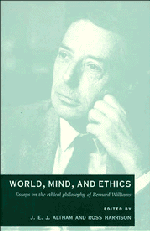Book contents
- Frontmatter
- Contents
- Notes on editors and contributors
- Introduction
- 1 The idea of equality revisited
- 2 Is the idea of purely internal consistency of choice bizarre?
- 3 Science, ethics, and objectivity
- 4 Fallibilism and objectivity: science and ethics
- 5 Might there be external reasons?
- 6 Aristotle on human nature and the foundations of ethics
- 7 A most peculiar institution
- 8 Reflection and confidence
- 9 The shape of a life
- 10 Replies
- Index
3 - Science, ethics, and objectivity
Published online by Cambridge University Press: 05 August 2012
- Frontmatter
- Contents
- Notes on editors and contributors
- Introduction
- 1 The idea of equality revisited
- 2 Is the idea of purely internal consistency of choice bizarre?
- 3 Science, ethics, and objectivity
- 4 Fallibilism and objectivity: science and ethics
- 5 Might there be external reasons?
- 6 Aristotle on human nature and the foundations of ethics
- 7 A most peculiar institution
- 8 Reflection and confidence
- 9 The shape of a life
- 10 Replies
- Index
Summary
In science, Bernard Williams maintains, we can hope that on each question our inquiries will yield ‘a convergence on an answer where the best explanation of the convergence involves the idea that the answer represents how things are’. Two features of science are, on Williams' account, crucial for the coherence of this hope. First, we can coherently hope of scientific concepts, theoretical as well as observational, that they are ‘world-guided’ – that is, that when they are competently applied the reliability of the resultant judgments can be explained in terms of their causal relation to the relevant states of affairs ‘out there in the world’. Secondly, our scientific beliefs can provide the basis for an ‘absolute conception of the world’, a conception that is ‘to a maximum degree independent of our perspective and its peculiarities’ and in terms of which ‘we may hope to explain the possibility of our attaining the conception itself, and also the possibility of other, perspectival, representations’.
In ethics, Williams argues, we cannot coherently hope that our inquiries will yield any such convergence of belief guided by the way things in reality are. For the two features of science that sustain this hope are lacking in ethics. The most general concepts of ethics are definitely not world-guided: ‘discussions at the reflective level, if they have the ambition of considering all ethical experience and arriving at the truth about the ethical, will necessarily use the most general and abstract ethical concepts such as “right” and the concepts do not display world-guidedness’.
- Type
- Chapter
- Information
- World, Mind, and EthicsEssays on the Ethical Philosophy of Bernard Williams, pp. 32 - 45Publisher: Cambridge University PressPrint publication year: 1995
- 1
- Cited by

